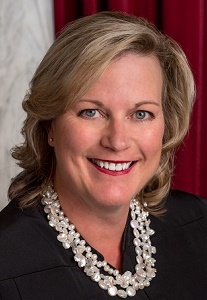CHARLESTON – The West Virginia Supreme Court of Appeals ordered the annulment of a Chapmanville attorney’s law license, stating that he preyed on a woman's vulnerability and violated the Rules of Professional Conduct.
Attorney Benjamin F. White convinced a woman known by the initials A.S. to hire him as counsel after she was charged with one count of felony child neglect in April 2015, according to the order filed in the West Virginia Supreme Court of Appeals.
A.S. alleged White never discussed his fee arrangement with her, but pursued a relationship with her, taking her on out-of-town trips, providing her with drugs and alcohol and engaging in a sexual relationship.

Justice Beth Walker authored the Supreme Court opinion on Benjamin F. White
White's actions caused A.S. to violate the terms of her probation, according to the order.
A.S. eventually reported White’s conduct and he was no longer her counsel by June 2015. White was then charged with violating several provisions of the West Virginia Rules of Professional Conduct.
A statement of charges was filed, but White failed to respond. The hearing panel subcommittee (HPS) of the Lawyer Disciplinary Board (LDB) recommended White's license be suspended for five years.
“Upon consideration of Mr. White’s egregious conduct, including the additional aggravating factor that Mr. White disregarded this Court’s order to file a responsive brief, we order that his license be annulled,” Justice Beth Walker wrote in the order.
White was admitted to the West Virginia State Bar in 2005. He was reprimanded once before in 2014.
The three current complaints against White all stem from allegations of misconduct regarding A.S.
White began talking to A.S. on Facebook in October 2014 when she was going through a divorce. When she was charged with one felony count of gross child neglect in April 2015, she was appointed an attorney, but White advised her that the court-appointed attorney was not as good as he was. She then sought to have White brought in as her counsel and the court-appointed attorney removed.
A.S.'s home confinement was suspended in May 2015 and White took her to Charleston to celebrate. While there, he purchased alcohol and had sex with her.
A week later, White took A.S. with him to an ATV convention in Kentucky and gave her Xanax, bought her alcohol and had sex with her again.
After that trip, White threatened to put A.S. in jail for one year for leaving her required alternative sentencing program classes early, despite her having permission to do so.
On June 22, 2015, A.S. told her community service manager, known as Ms. Maynard in the document, about White’s behavior.
“Ms. Maynard accompanied A.S. to the judge's office, where A.S. requested a new lawyer,” the opinion states. “On June 24, 2015, Mr. White was removed as counsel and Theresa McCune was appointed to represent her. A.S.’s probation was ultimately revoked due to a failed drug screen and she was sentenced to jail as a result.”
A.S. testified that the situation with White was very stressful and embarrassing, and had occurred at a very vulnerable time in her life.
White failed to respond to the formal charges filed against him. On Sept. 13, the Office of Disciplinary Counsel (ODC) filed a consent to the recommendations by the HPS.
“Absent extenuating circumstances, we question whether a respondent attorney who disregards the directives of this court and altogether fails to advocate for himself—to maintain his career—will adequately advocate for his or her clients,” Walker wrote. “Accordingly, we conclude that a respondent attorney’s violation of this court’s scheduling order will be deemed an aggravating factor and may give rise to heightened discipline.”
Walker wrote that the court found White’s "egregious violations of the standards of the legal profession, combined with his outright unwillingness to comply with the directives of the court," were sufficient to warrant annulment.
West Virginia Supreme Court of Appeals case number: 16-1003
